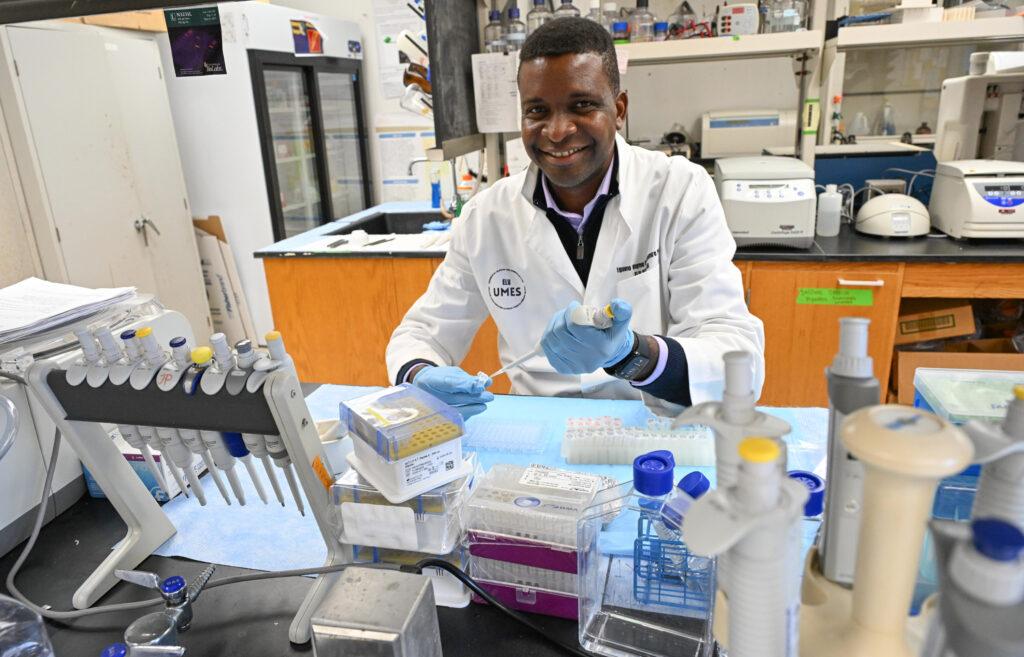
UMES is answering the call to develop a better understanding of PFAS in Maryland, particularly on the Eastern Shore, through a gamut of grant-funded research projects.
Maryland is creating an approach to PFAS taking into account what has been learned from other states, like Maine, that were at the forefront of addressing this hot-button issue. Widely distributed in the environment, the estimated 12,000 compounds classified as per- and polyfluoroalkyl substances have become increasingly concerning.
Maine, where PFAS was first detected in 2016 and standardized testing and tracking began in 2021, became the first state to ban products containing the substances. The state has since become a model for its response, including for agriculture.
“They have one of the strongest chemical bonds we know of, leading to its persistence and bioaccumulation. This perfect storm will be part of the environmental landscape and for a very long time. It will be in every corner of what EPA does,” said Dr. Greg Allen, an environmental scientist with the Environmental Protection Agency’s Chesapeake Bay Program Office and a UMES alumnus.
Allen spoke during an April 2024 PFAS summit hosted by the University of Maryland Eastern Shore’s School of Agricultural and Natural Sciences. Representatives of federal and state agencies, researchers, and Maine stakeholders were in attendance.
“The focus of the collaborative workshop was to gather PFAS stakeholders to hear from those who have experienced its challenges and those resolved to finding solutions and ways to move forward,” said Dr. Moses T. Kairo, dean of the school. “Our goal as a university is to identify the research, outreach and support we can provide citizens of Maryland in addressing these issues through our Agricultural Experiment Station, UMES Extension and by exploring the establishment of a dedicated center.”
Congress appropriated $8 million fiscal year 2023 to the EPA to work with the U.S. Department of Agriculture to fund research that prioritizes helping farmers, ranchers and rural communities manage PFAS impacts, reduce exposure in the food supply and promote farm viability.
UMES was the recipient of nearly $1 million across ongoing research projects addressing PFAS. According to Dr. Joseph Pitula, director of research and professor of natural sciences at UMES, work encompasses:
- Investigating PFAS uptake and accumulation in relation to soybean reproductive phenotypes. UMES researchers are examining the types of PFAS that accumulate in the roots and beans under different exposure and environmental conditions. The genes uniquely expressed in response to PFAS exposure are also being observed with the goal of discovering ways to limit PFAS uptake.
- Studying the effects of crop-accumulated PFAS on pest development and proliferation. The focus is on how PFAS exposure impacts insect herbivory and larval gene expression profiles, particularly those related to insect metamorphosis.
- Researching PFAS in Maryland and Chesapeake Coastal Bays and associated aquatic species. This project investigates the types and levels of PFAS present, in addition to investigating whether PFAS exposure correlates with infection rates in blue crabs.
- Examining the impact of wastewater treatment plants and biosolid application on PFAS levels in waterways. Assessments are being made on how these factors contribute to PFAS contamination in aquatic environments.
- Developing modified biochar variants for PFAS immobilization. The project explores using recycled organic and inorganic materials to create biochar capable of immobilizing PFAS in the soil.
- Investigating the potential of mosquitoes as bio-monitors for environmental and population PFAS exposure. Evaluations are being conducted to ascertain whether insects such as mosquitoes can serve as effective indicators of PFAS levels in various ecosystems.
The university is tackling the complexity of PFAS by increasing understanding of the problem, assessing the impact and developing solutions, said Dr. Eguono “Wayne” Omagamre (above), assistant professor of biology and part of the PFAS research team at UMES.
“UMES aspires to be a key resource, or one-stop shop, when it comes to research on these forever chemicals and the path forward,” he said.
Gail Stephens, agricultural communications and media associate, University of Maryland Eastern Shore, School of Agricultural and Natural Sciences, UMES Extension, gcstephens@umes.edu., 410-621-3850.
Photo by Todd Dudek, agricultural communications, University of Maryland Eastern Shore, School of Agricultural and Natural Sciences, UMES Extension, tdudek@umes.edu.

